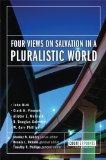More Than One Way? Four Views on Salvation in a Pluralistic World. Edited by Dennis L. Okholm and Timothy R. Phillips. Grand Rapids: Zondervan Publishing House, 1995. 283 pp. Paper, $16.99.
More Than One Way? is a unique volume in that it includes the perspective of liberal pluralist John Hick. The book contains four different perspectives. Hick contends for Unitive Pluralism, the idea that all religions are on an equal footing before God and provide salvation in their own right.
Clark Pinnock presents Inclusivism, arguing that Jesus Christ is the ground of all salvation but that He does not need to be known by the one being saved.
Alister E. McGrath represents a Particularist view, insisting that one must knowingly trust in Christ as Savior to obtain eternal life. He believes that God is not restricted by using humans to preach the Gospel but can use other means for reaching people who would otherwise never hear of Christ. This may entail visions and dreams.
The fourth view, that of R. Douglas Geivett and W. Gary Phillips, contends for a Particularist view that is more exclusive than that of Alister McGrath. They argue from the Bible for the existence of a personal God who is exclusive from a philosophical perspective. They were the only ones to give careful exegesis of John 3:16, 18; 14:6; 17:20, Acts 4:12, and Rom 10:9-15. Geivett/Phillips state categorically that people must hear the Gospel from a human evangelist to be saved, seeing there is no other possibility from a biblical perspective.
The evangelical authors refute pluralists on a philosophical level. Pluralism is based on skepticism, which refutes their own truth claims as well as that of others. If all truth is relative then so is the proposition that all truth is relative! Pluralists also approach other religions from the perspective that they alone can see the truth behind all of them. They are the only ones who can see that all the religions are trying to explain the same unknowable Real/Ultimate Being. The other authors rightly ask, given his philosophical presuppositions, how Hicks can know that, since he also suffers from self contradiction. If we cannot know anything about God then neither can John Hick!
Hick also denies the incarnation and deity of Christ. He recognizes that if Jesus was God in the flesh on earth then Christianity is uniquely true and is God’s way for everyone to come to Him. Since this does not fit his Pluralism, he argues for an evolutionary growth of the doctrine of the deity of Christ in the early church. The evangelical authors rightly point out that he was a pluralist first before he came to his conviction of Christ. Because of space limitations they could only point to scholarly studies on Christ and the Bible in defense of the inspiration of Scripture and the Deity of Christ.
Hick brings up one argument not adequately answered by the other writers: If Christianity is the only true way and it alone has the Holy Spirit, then why don’t we see an observable difference in the morals of Christians as opposed to adherents of other religions? He feels that it is not noticeable, which indicates that all people have a relationship with the ultimate. The evangelical authors point out that morals do not settle the truth question. Someone can believe something false and be a nice person. Geivett/Phillips point out that all are sinners before God and that the moral superiority of Christianity is attested in the sinless life of Christ as opposed to that of fallible Christians. Pinnock does mention that the fruits of the Christian Gospel—human rights, democracy, care of the sick and poor, and self giving service—are much better than that of Islam (which tends to produce intolerant governments) and that of Eastern religions (which produce stagnant societies). I would add that in Hinduism a person’s suffering is seen as its way of working off “Karmic debt.” To alleviate the suffering of another would postpone their “salvation.” In Mere Christianity C. S. Lewis points out that people need to be taken individually. What would a person with a lot of problems be like if he were not a Christian? Or what would a “nice” person be like if she were a Christian? Many “good” people don’t see their need for Christ precisely because they are nice. People with big flaws in their lives often see their need for Christ much sooner. Christ does make an observable difference in the lives of those who desire to walk with Him. However as I have worked with Muslims and Hindus, I have observed a difference in the area of honesty and integrity in their lives. This is the experience of every other missionary that I have spoken to. So I would directly challenge Hick’s premise on not only its relativity but its accuracy.
The bulk of the responses by the authors was directed toward refuting Pluralism. There were, however, comments made on every perspective. More Than One Way? is a good book with which to get a handle on the various views on this subject.
R. Michael Duffy
Missionary
The Hague
Netherlands

